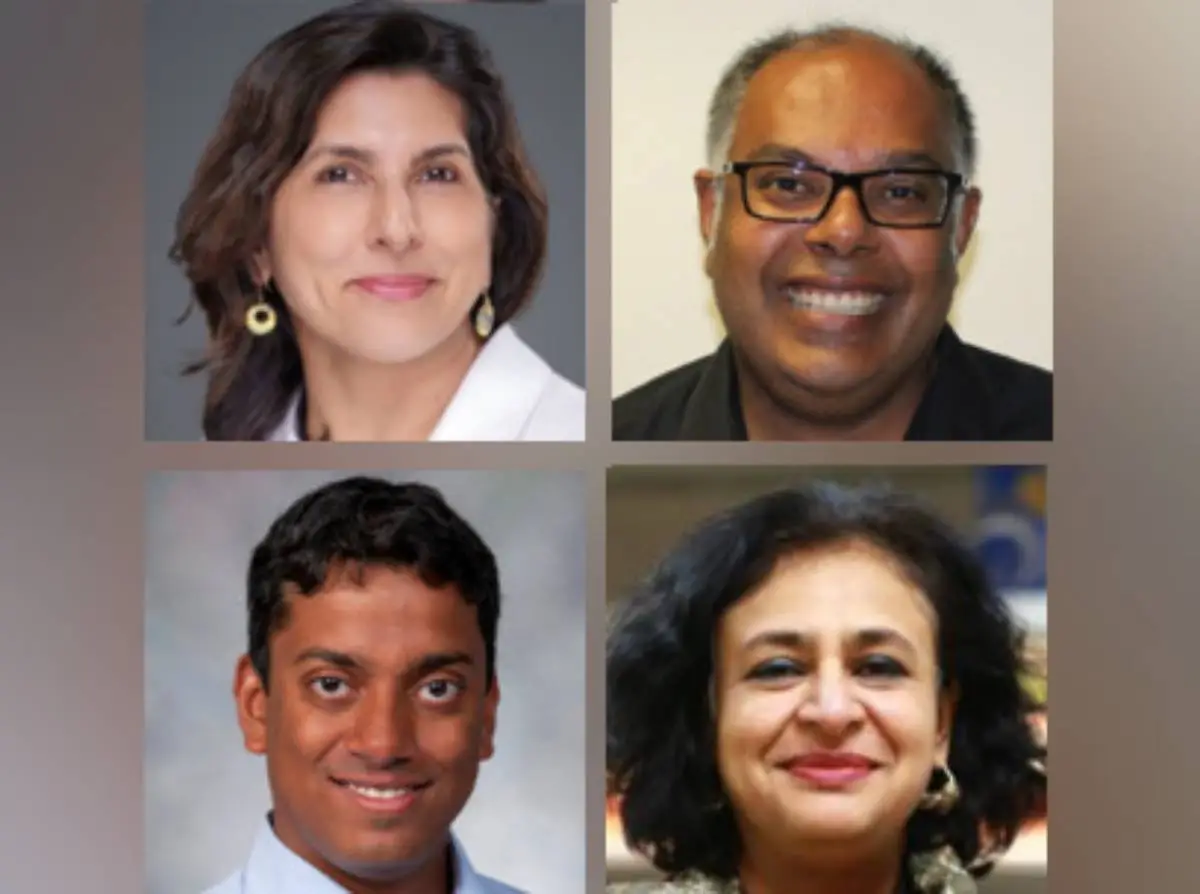
Four Indian American Professors In 100th Class Of Guggenheim Fellows
Photo: (Top Row, Left to Right) Bijal P. Trivedi, Saurabh Jha, (Bottom Row, Left to Right)Swarat Chaudhuri, Tulasi Srinivas
India-West Staff Reporter
The 100th class of Guggenheim Fellows of 198 distinguished individuals working across 53 disciplines was selected from a pool of nearly 3,500 applicants, the John Simon Guggenheim Memorial Foundation announced.
Four Indian American college professors are among this year’s Fellows: Swarat Chaudhuri, Saurabh W. Jha, Tulasi Srinivas, and Bijal Pravin Trivedi.
“At a time when intellectual life is under attack, the Guggenheim Fellowship celebrates a century of support for the lives and work of visionary scientists, scholars, writers, and artists,” said Edward Hirsch, award-winning poet and president of the Guggenheim Foundation. “We believe that these creative thinkers can take on the challenges we all face today and guide our society towards a better and more hopeful future.”
Established in 1925 by founder Senator Simon Guggenheim, each Fellow receives a monetary stipend to pursue independent work at the highest level under “the freest possible conditions, the foundation said.
Swarat Chaudhuri is a professor of computer science at the University of Texas at Austin. His lab has developed an AI agent called Copra that repeatedly asks a large language model to predict the next step in a proof of a mathematical theorem. Through the fellowship, Chaudhuri will work on designing an AI agent that proposes new math problems and their solutions, and another one that evaluates the “interestingness” outputs of the first agent. As such, it will be an important step, Chaudhuri said, toward “building AI systems that can co-author research papers with human mathematicians,” which would represent a major advance in the use of AI for mathematics.
Saurabh Jha is a Distinguished Professor in the Department of Physics and Astronomy at Rutgers, the State University of New Jersey. His main research focus is the observational study of Type Ia supernovae. He is interested in understanding the properties of exploding white dwarf stars and using this knowledge to turn them into tools with which to survey the Universe. Previously, he was a Panofsky Fellow at the Kavli Institute for Particle Astrophysics and Cosmology at the Stanford Linear Accelerator Center, a Miller Fellow in the University of California, Berkeley Department of Astronomy, and a graduate student at the Harvard-Smithsonian Center for Astrophysics.
Tulasi Srinivas is a professor of Anthropology, Religion, and Transnational Studies at The Marlboro Institute for Interdisciplinary Studies at Emerson College. She is a fellow of the Royal Asiatic Society and the Indian Sociological Society. Her research focuses on comparative ethics and Hinduism. Her books explore themes such as wonder, beauty, and grace through ethnographic explorations, and her recent work considers climate justice and religious ecology in a post-colonial context through the story of water in her hometown of Bangalore. She has her PhD through the interdisciplinary University Professors Program at Boston University, an MA in Urban Studies from USC and BA in Architecture from Bangalore University. Before joining Emerson, she taught at Wheaton College and at the Berkley Center for Religion and Peace at Georgetown University. She is a decorated author and editor of six books and over 30 award-winning journal articles and book chapters.
Bijal P. Trivedi is an award-winning freelance journalist specializing in longform narrative features about biology, medicine, and health. She currently works as the senior science editor for National Geographic. She has just completed her first book, “Breath from Salt: A Deadly Genetic Disease, a New Era in Science, and the Patients and Families Who Changed Medicine Forever.” Her New Scientist story “Slimming for Slackers” won the 2006 Wistar Institute Science Journalism Award. Most recently, her feature “The Wipeout Gene” was selected for The Best American Science and Nature Writing: 2012. She taught in New York University’s graduate Science, Health and Environmental Reporting Program from 2007 to 2012. She is now based in Washington, DC.




